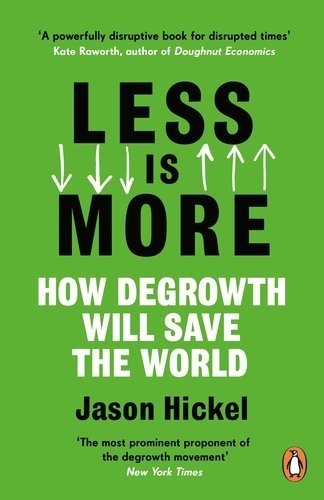Less is More: How Degrowth Will Save The World an Anarchists Review
-Bjorn Olson
I recently listened to Jason Hickel’s book Less is More: How Degrowth Will Save The World while simultaneously skimming and underlining passages in a print copy. I made a prediction before I began reading/listening to the book: I guessed that I would agree with his justifications for why (if we wish to save the world and our species) we must abandon perpetual growth capitalism, but I assumed that I would disagree or find faults with his means for how to achieve this desired outcome. I was right, but maybe a little less right that I’d guessed.
I will begin by saying that his history of capitalism is well-researched and illuminating. I believe that he doesn’t pick up the history far enough back, however, but from his starting point, 500 years ago, he weaves a powerful narrative, which does a fine job of explaining how we got into the mess we are currently in, which began with enclosure and was followed by Colonialism. I am of the conviction that if more people understood the history and methodologies of perpetual growth capitalism, that we would begin to understand that it is just a story, a myth, one that we happily lived without for hundreds of thousands of years, and that that understanding can liberate us to tell a new story, a better story. I give Jason Hickle an A+ grade for his research and scholarship into the history of capitalism. If for no other reason I recommend the book.
His history begins after the bubonic plague, when many peasants began revolting against the feudal system and re-claiming their autonomy. Important to this time in history, land that had been “owned” by the ruling elite was turned back into commons—a natural resource base for any and everyone to subsist from. “The rebels,” he says, “weren’t interested in tweaking the system a bit around the edges - they wanted nothing short of a revolution.” This is an important point that revolutionaries throughout history have made. As Fredric Douglass famously stated ”power concedes nothing without a demand.” And this leads me to my primary criticism of the book. Jason Hickle demands nothing; sadly, he seems more interested in the tweaks around the edges. A limp and reformist approach.
By the way, spoiler alert, the peasants lost.
We currently live in a time of crazy-making, delusional thinking. For instance, in progressivist and environmentalist circles (the circles I often find myself in) we rally behind the cause of decarbonizing the economy. Climate change is serious business and we all know what is causing it. However, concurrent with our climate crisis, we are also facing other ecological crises including planetary overshoot. To demand that we decarbonize our economy with renewable energy, without also addressing perpetual growth mindsets, is little more than robbing Peter to pay Paul. It was refreshing to read a progressivist who fully comprehends the accounting problem that most environmentalists either ignore or try to pretend doesn’t exist.
“Whenever there appears to be a conflict between ecology and growth,” he observes, “economists and politicians opt for the latter and try ever more creative ways to get reality to conform to it. Politicians are willing to bet everything on speculative technologies to avoid facing the imperative of radical emissions reductions. Proponents of green growth resort to outlandish imaginary scenarios and clever accounting tricks to maintain the illusion that we can carry on with the status quo. They are willing to risk everything—literally everything—just to keep GDP rising.”
This observation gets to the heart of the crazy-making world I confront daily. Alaska, for instance, is being sized up by the federal and state governments and by multinational mining companies. The staggering quantity of transition metals that will be required to decarbonize our grids, transportation, and more, the proponents for perpetual growth capitalism are insisting upon, must come from somewhere. Green energy is an oxymoron.
On one hand, it appears that Jason Hickle fully understands the disastrous ecological implications of the green energy transition, but on the other hand he still advocates for it albeit in a post-growth context. Unfortunately, he provides no hard numbers nor does he address which areas of the world we should be willing to sacrifice for these materials. Is it Alaska?
Central to one of the book’s core thesis’ is Jevon's Paradox, which observes that when technological progress or government policy increases efficiency with which a resource is used, demand increases and the ecological benefit of the efficiency is outstripped by the newly increased demand. Improved efficiency, it has been shown over and over, leads to increases in income and accelerates economic growth further increasing demand for resources. This explains why, despite all the education, government subsidization, and the widespread adoption of renewable energy around the world, our global carbon emissions are still going up and up. Without a degrowth ethos baked into the energy transition, all we are doing is hastening the destruction of the living world. Again, it is refreshing to read someone who understands that there really is no paradox here—it’s how perpetual growth capitalism is designed to work.
Another core point to the book is the overwhelming evidence that shows that after our hierarchy of needs are met, more material wealth accumulation does not lead to better or even longer lives for humans. He cites Costa Rica as an example: “We know that Costa Ricans live long lives: around eighty years on average. But the researchers had noticed that the Nicoyans live even longer, with a life expectancy of up to eighty five years—one of the highest in the world. This is odd, because Nicoya is one of the poorest parts of Costa Rica, in monetary terms. It is a subsistence economy where people live traditional lives.” Their longevity, it has been determined, is the result of tight social bonds, feeling valued, and connected, which are the things perpetual growth capitalism spurns in favor of individualism and competition.
Was there ever a time when human beings weren’t so destructive to ourselves and the rest of the living world, and is there a map out of this maze? Radical anthropologists and Anarchists say yes. Unfortunately, Hickle gets right to the edge of this precipice of understanding, but backs away from the full implication and leaves off with very little meat for his readers to sink their teeth into.
Dualism and anthropocentrism, almost universally accepted and embraced in this era, are very new ideas for human beings. I was pleased and somewhat surprised to read his appreciation of and for Animism, the metaphysics that all humans once lived with, embraced, understood, and felt. For instance: “[T]he Achuar (Amazonian hunter-gatherers) know that their existence depends on maintaining good relationships with the teeming community of non-human (or more-than-human) persons with whom they share the forest. They know that they are fundamentally interdependent; that without them they would be nothing—non-existent. Their fates are bound together.”
Ethnographers the world over make similar observations regarding “primitive” hunter-gatherers’ understanding that all life is interdependent, and that healthy relationships are based upon reciprocity. This is perhaps the most profound and fundamental concept that has been corrupted and broken by civilization, capitalism and theism. Taking more than you need and thinking that you are granted special, extra-ordinary privilege is aberrant thinking that comes with dire consequences. Mr. Hickel makes the observation but sadly he steers his readers back to the central authority of top down-governments and the hierarchical systems and societal arrangements we are accustomed to. He just hopes, without the slightest shred of evidence, that our governments will suddenly come to their senses and that we’ll start using less.
No one has a crystal ball nor can anyone say for certain how the Anthropocene and the global civilization we have created are going to play out. If I had to guess, however, I suspect that real behavioral change won’t come until the collapse is more seriously felt and that restraint won’t come until it is the only option left available. If I were to write the story, it would be based on a soft landing approach—one in which humans simply walk away from central governments and authority, remembering that they unnecessary, harmful, deeply colonial institutions; that wealth accumulation and resource hoarding is to be avoided at all cost; and that true wealth comes from strong social bonds, access to wildness, clean food, water and air.
I believe that people should read Less is More. The imaginary battle line that the so-called Left and the so-called Right have created when it comes to the economy is nothing more than excruciatingly painful, empty chatter created by the corporate media. Both wings fully embrace the same destructive construct of perpetual growth. Less is More may help deepen people’s understanding of where the conversation needs to be steered if we want to avoid the worst effects of global warming and the collapse of our ecosystems. However, I ultimately think the book should be read alongside other authors like John Gowdy, John Zerzan, Paul Shepherd, Marshall Sahlins, Colin Ward, Peter Marshall, the classic Anarchist thinkers such as Malatesta, Bakunin, Kropotkin, and many, many others who have swum further from the shore as Hickel has dared to.
It is no longer surprising to me that there are so many economists who are also anthropologists and vice versa. This suite of skills and scholarship lends itself to grappling with the big problems we are facing today. There is genuine compassion for the living world and a beautiful appeal to demand the impossible within the book. Mr. Hickel may very well already have the map out of the maze and is too afraid to share it because he fears it is too radical for the mainstream, progressivist audience he is appealing to. I think it’s more likely, however, that he just hasn’t yet fully accepted the reality of what his research into anthropology and economics are showing him. Read Less is More for insights, but I caution you to be wary of solutions that maintain the systems of oppression and domination that we are supposedly attempting to subvert in order to save the World.

